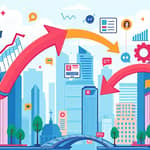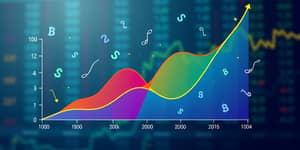
The technology sector stands at a pivotal juncture as we head into 2025 and beyond. Accelerated by unprecedented innovation and growing investments, industry leaders and emerging players alike are shaping a future where digital transformation, artificial intelligence, and next-generation connectivity redefine how we live and work.
This comprehensive exploration delves into the major forces driving growth, the most impactful trends, and the strategic priorities businesses must embrace to thrive in this rapidly evolving landscape.
Global IT spending is surging, with forecasts indicating that global IT spending is projected to exceed $5.6 trillion in 2025. The allocation of these resources reveals where enterprises are placing their bets:
With a 5.76% compound annual growth rate driving market expansion, organizations are prioritizing scalable, secure solutions and seeking competitive edges through advanced analytics and automation.
The semiconductor industry is poised for a renaissance, fueled by demand for gen-AI workloads and resilient supply chains. Analysts project semiconductor sector will see double-digit revenue growth in 2025 as companies innovate at unprecedented speed.
Investments in localized manufacturing and strategic partnerships are emerging as critical approaches to mitigate disruptions and secure long-term chip availability.
Artificial intelligence continues to reshape industries, with generative AI chips and autonomous agents promising significant productivity gains. Enterprises are exploring AI-driven chip design and manufacturing to deliver more specialized silicon for diverse workloads.
Agentic AI, or autonomous AI agents, offer the potential to streamline decision-making processes for knowledge workers, though widespread adoption may span several years as organizations address integration and governance challenges.
The rollout of 5G is accelerating, delivering up to ten times the speed of 4G and unlocking new possibilities for IoT, augmented reality (AR), and virtual reality (VR). Meanwhile, early research into 6G promises groundbreaking bandwidth and latency improvements.
In VR and AR, hardware innovation has yielded lighter, more immersive headsets, catalyzing applications in gaming, enterprise training, and retail. We can expect AR glasses to become more commonplace, transforming how consumers engage with digital content in everyday environments.
Cloud platforms remain the backbone of digital transformation, offering elastic scalability, robust security frameworks, and integrated analytics. Businesses leverage cloud native architectures to process vast volumes of data from connected sensors and devices.
IoT and big data initiatives are evolving from descriptive reporting to predictive and prescriptive insights. Companies that harness real-time analytics gain a competitive advantage through improved operational efficiency and proactive decision-making.
As attack surfaces expand with IoT deployments and cloud migrations, cybersecurity has become non-negotiable. Projections indicate global cybercrime costs will reach $10.5 trillion in 2025, underscoring the need for advanced threat detection and incident response strategies.
Organizations are investing in zero-trust architectures, AI-powered security operations centers, and supply chain risk assessments to fortify defenses and ensure business continuity.
Environmental considerations are increasingly influencing technology decisions. Major firms are optimizing server farms and data centers for energy efficiency and data center sustainability, deploying liquid cooling, renewable energy sources, and AI-based power management.
These efforts align with tightening regulations and rising customer expectations for corporate responsibility, driving a shift towards carbon-neutral operations.
Consumer electronics, such as PCs and smartphones, are experiencing modest growth, while infrastructure segments supporting AI workloads are booming. Mobile OS integration with specialized edge AI chips signals new user experiences and differentiated performance.
In sectors like food and beverage, digital transformation is reshaping production and supply chains. Companies are:
The horizon brims with nascent technologies poised to disrupt further:
While artificial general intelligence (AGI) remains speculative, industry discourse suggests that full automation of certain societal functions may emerge by mid-century, ushering in profound ethical and economic considerations.
As we move into 2025 and beyond, the fusion of these trends heralds an era of rapid transformation. Organizations that adopt a holistic, data-driven approach—balancing innovation, security, and sustainability—will be best positioned to lead this next wave of technological progress.
References













